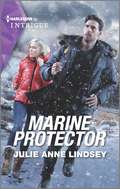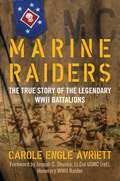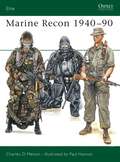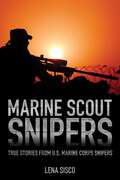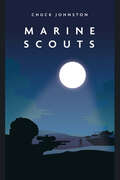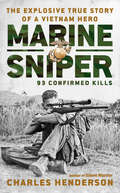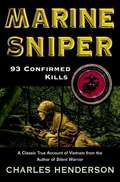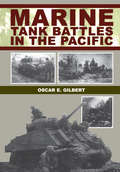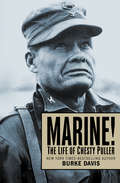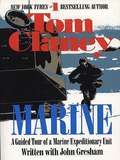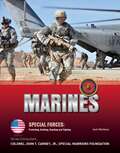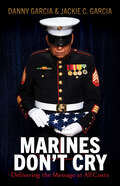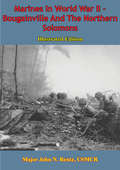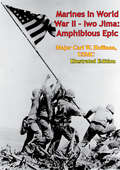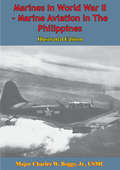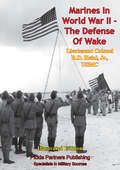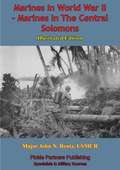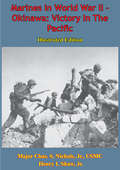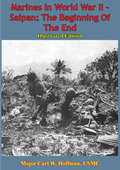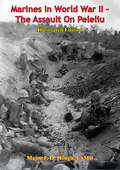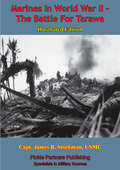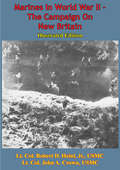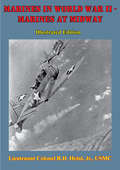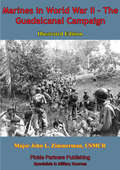- Table View
- List View
Marine Protector: The Line Of Duty (blackhawk Security) / Marine Protector (fortress Defense) (Fortress Defense #3)
by Julie Anne LindseyA serial killer has made a widowed single mom his next target…But first he’ll have to square off with one tough marine.Pursued by a madman, single mom Lyndy Wells and her infant son become bodyguard Cade Lance’s priority assignment. When Lyndy suggests the former marine pose as her boyfriend to draw out the predator, they are met with a near lethal response. Now Cade knows they must find the serial killer quickly or Lyndy and her baby will face grave danger. And Cade won’t let that happen on his watch.
Marine Raiders: The True Story of the Legendary WWII Battalions
by Carole Engle AvriettFORGOTTEN NO MORE.The American people revere their elite combat units, but one of these noble bands has been unjustifiably forgotten—until now.At the beginning of World War II, military planners set out to form the most ruthless, skilled, and effective force the world had ever seen. The U.S. Marines were already the world&’s greatest fighters, but leadership wanted a select group to conduct special operations at the highest level in the Pacific theater. And so the Marine Raiders were born.These young men, the cream of the crop, received matchless training in the arts of war. Marksmen, brawlers, and tacticians, the Marine Raiders could accomplish their objective before the enemy even knew they were there.These heroes and their exploits should be the stuff of legend. Yet even though one of their commanders was President Roosevelt&’s son, they have disappeared into the mists of history—the greatest warriors you&’ve never heard of.Carole Engle Avriett&’s thorough telling of the Marine Raider story includes:The personal narratives of four men who served as Marine RaidersFrontline accounts of the Raiders&’ most important engagementsThe explanation for their obscurity, despite their earlier fameThe Marine Raiders were one of the greatest forces ever to take the field under the American flag. After reading this book, you&’ll know why.
Marine Recon 1940-90
by Paul Hannon Charles MelsonIn 1976 Maj. James Capers Jr. welcomed new men and their families into a force reconnaissance company. 'Only the most capable Marines are selected for this duty due to rigid mental and physical demands. A very thorough screening of each applicant is conducted ... to test alertness and endurance. The result is a small elite unit with highly qualified Marines who are considered the best in the world'. Ex-Marine Charles D Melson examines the history, equipment and insignia of the Marine's amphibious and ground long-range patrol reconnaissance specialists in this volume which contains a wealth of photographs and 12 full page colour plates by Paul Hannon.
Marine Scout Snipers: True Stories from U.S. Marine Corps Snipers
by Lena SiscoAuthor Lena Sisco, a former Department of Defense Military Interrogator and U.S. Navy officer,takes the reader through the missions and personal lives of U.S. Marines who have been forward-deployed in hostile environments all across the Middle East. She shows how they use the mastery of their sniper skills to mitigate threats and negate the enemy&’s ability to disrupt U.S. operations. Her book lets you feel the stress and anxiety of their operational tempo; you witness their successes and failures, their struggles, and lessons learned. Snipers are highly trained, brave, silent killers. They undergo specialized training and operate independently with little support from their parent commands, close to enemy positions. Snipers are chosen based on their marksmanship, mental stability, patience, and physical ability. They stalk the enemy, while concealed in their operational overwatches, to protect our checkpoints and convoys, and to direct action missions. Despite the renown of Chris Kyle and the extraordinary success of the book and movie American Sniper, snipers do not have lead lives of glory and fame; their lives are a struggle. Serving as a sniper requires that you do your job successfully every time, because the consequences of not being successful include the loss of innocent lives, or living with other consequences that can haunt a shooter till the day he dies. In the end, just like any other service members, they put their lives on the line – willingly – to defend our freedom and liberties, and our country.
Marine Scouts (Casemate Fiction)
by Chuck JohnstonAfter playing cat and mouse in Iraq to gain crucial intelligence, a group of Marines think they are on their way home, but their war isn’t over.August, 1990—30,000 Iraqi troops have invaded Kuwait and are in a position to influence nearly half of the world’s oil supply. The United Nations condemns the aggression, but it is clear that only military intervention will displace Saddam Hussein. Captain Joseph “Quarry” Samuels and the Marines of Scout Platoon, 2nd Battalion, 2nd Marine Division are tasked with discovering the strength and deployment of Iraqi troops. Quarry and his scouts are soon engaged in a game of cat and mouse with the 10,000-strong 108th Iraqi Armored Division. Operating behind enemy lines, they put themselves squarely in danger to collect the intelligence necessary to launch military operations. When hostilities end, with the greatest one-sided military victory of all time, the Marines deserve to be on their way home. However, Quarry remains in Kuwait to continue the deadly game with an old nemesis, but this time with a new ally on his side . . . Praise for Marine Scouts“Johnston . . . draws on his twenty-eight years of service for his engrossing debut, a minutely detailed, realistic tale of one unit’s actions during Operation Desert Storm. . . . By incorporating such things as call signs and entire briefings, Johnston immerses the reader into the ongoing, swiftly moving military operations. . . . Military action fans will look forward to more from this talented author.” —Publishers Weekly“A compulsively riveting novel of war and intrigue from cover to cover, Marine Scouts by Chuck Johnston is the stuff of which blockbuster movies are made.” —Midwest Book Review
Marine Sniper
by Charles HendersonTells the exciting true story of Sergeant Carlos Hathcock, a legendary Marine sniper in the Vietnam War.
Marine Sniper
by Charles HendersonTells the exciting true story of Sergeant Carlos Hathcock, a legendary Marine sniper in the Vietnam War.
Marine Sniper: 93 Confirmed Kills
by Charles HendersonThere have been many Marines. There have been many marksmen. But there has only been one Sergeant Carlos Hathcock. A legend in the Marines ranks, Hathcock stalked the Viet Cong behind enemy lines--on their own ground. And each time, he emerged from the jungle having done his duty. His record is one of the finest in military history, with ninety-three confirmed kills. This is the story of a simple man who endured incredible dangers and hardships for his country and his Corps. These are the missions that have made Carlos Hathcock a legend in the brotherhood of Marines. They are exciting, powerful, chilling, and all true
Marine Tank Battles In The Pacific
by Oscar E. GilbertNo previous book has been devoted to Marine Corps armor in World War II. Gilbert's gripping narrative combines exhaustive detail on Marine armor and combat with moving eyewitness accounts, never before published, of what it was actually like to be a Marine tanker in action in the Pacific.
Marine!: The Life of Chesty Puller
by Burke DavisThe gripping story of an extraordinary American hero, the most decorated man in US Marine Corps history, from a New York Times–bestselling author.&“We are flanked on both sides by an enemy that outnumbers us 29:1. They can&’t get away from us now!&” —Lewis B. &“Chesty&” Puller, USMC In the glorious chronicles of the US Marine Corps, no name is more revered than that of Lt. Gen. Lewis B. &“Chesty&” Puller. The only fighting man to receive the Navy Cross five separate times—a military honor second only to the Congressional Medal of Honor—he was the epitome of a professional warrior. A son of the South, descendant of Robert E. Lee, and cousin to George S. Patton, Puller began his enlisted career during World War I and moved up through the ranks as he proved his battlefield mettle in Haiti and Nicaragua, with the Horse Marines in Peking, in the Pacific Theater of World War II, and in the nightmarish winter engagements of the Korean War. Fearless and seemingly indestructible, adored by the troops he championed yet forced into early retirement by a high command that resented his &“lowly&” beginnings and unwillingness to play politics, Puller remains one of most towering figures in American military history. Bestselling military biographer Burke Davis paints the definitive portrait of this extraordinary marine hero.
Marine: A Guided Tour of a Marine Expeditionary Unit
by Tom ClancyAn in-depth look at the United States Marine Corps-in the New York Times bestselling tradition of Submarine, Armored Cav, and Fighter WingOnly the best of the best can be Marines. <P><P>And only Tom Clancy can tell their story--thefascinating real-life facts more compelling than any fiction. Clancy presents a unique insider's look at the most hallowed branch of the Armed Forces, and the men and women who serve on America's front lines.Marine includes:An interview with the Commandant of the Marine Corps, General Charles "Chuck" Krulak The tools and technology of the Marine Expeditionary Unit
Marines (Special Forces: Protecting, Building, Te)
by Jack MontanaIn September 2001, in response to terrorist attacks on New York and Washington D.C., the American forces, including the U.S. Marine Corps (USMC), were put on the highest level of military alert since the Cuban Missile Crisis of 1962. These soldiers are among the toughest in the world; the prestige of the unit is second to none. The entry system for new recruits is a supreme test--only about 25 percent make the grade. Over the course of an intensive 40-week "basic" training program, trainers shout at new recruits, force them to run for miles, deprive them of sleep for days at a time, and require them to make decisions almost every waking minute. This book teaches you what it takes to become a U.S. Marine. It is a grueling challenge that only the strongest survive. You need: * intelligence * self-control * courage * knowledge * resistance to pain and discomfort * team spirit
Marines Don't Cry: Delivering the Message at All Costs
by Danny Garcia Jackie C. GarciaThe minister and former Marine tells his story of miraculous transformation from growing up in Spanish Harlem to walking around the world for peace. Known to many as the Walking Man, Danny Garcia has taken more than 52,000,000 steps across six contents to spread God&’s message of love and peace. In this powerful memoir, he not only tells the story of his inspiring ministry, but also recounts his own personal journey of transformation, from darkness and sorrow to a life of light, joy, and freedom in Christ. Danny tells of growing up in Spanish Harlem before joining the Marines as a teenager. He went on to serve in law enforcement before being called to the ministry. With frank honesty, he discusses his conversion from a life wasted on drugs to one of devotion to knowing and serving God at all costs. Marines Don&’t Cry describes Danny&’s encounters with Pope John II, U.S. presidents, kings and queens, heads of states and global figures. It is an inspiring story of faith, the transformative power of God&’s love, and how Danny has made it his life&’s work to love his neighbor, to love himself, and to spread hope.
Marines In World War II - Bougainville And The Northern Solomons [Illustrated Edition]
by General C. B. Cates USMC Major John N. Rentz USMCRContains 51 photos and 28 maps and charts.The fight to remove the barriers protecting the main base of the Japanese in New Guinea at Rabaul, was characterized by brutal jungle fighting attritional warfare of the worst sort and required every bit of toughness from the Marines that landed there."BOUGAINVILLE AND THE NORTHERN SOLOMONS is a narrative not only of Marines against the Japanese, but of Marines against the jungle. In all the past history of the Corps, whether it be Nicaragua, Haiti, or Guadalcanal, it is improbable that Marine units ever faced and defeated such an implacable combination of terrain and hostile opposition.In this struggle, as always, superior training, discipline, determination and unquestioning will to win on the part of individual Marines were the crucial factors. Indeed, those same factors may be said to constitute common denominators of victory under any circumstances, whether jungle or atoll, on the ground or in the air. -C. B. CATES, GENERAL, U. S. MARINE CORPS, COMMANDANT OF THE MARINE CORPS"
Marines In World War II - Iwo Jima: Amphibious Epic [Illustrated Edition]
by General Lemuel C. Shepherd USMC Lt. Col. Whitman S. Bartley USMCOn the 19th Feb. 1945, the first Marines landed on Iwo Jima, the first enemy troops to invade Japanese home territory; many of those brave soldiers would never leave the black volcanic sands again as they fought and died in the U.S. Marine Corps toughest ever battle.Contains 100 photos and 26 maps and charts."The assault on Iwo Jima came as a smashing climax to the 16-month drive that carried the amphibious forces of the U.S. across the Central Pacific to within 660 miles of Tokyo. Striking first at Tarawa in November 1943, American forces had swept rapidly westward, seizing only those islands essential for support of future operations. Many powerful enemy strongholds were bypassed and neutralized. By the fall of 1944 the small but heavily fortified island of Iwo Jima, lying midway between the Marianas and the heart of the Japanese Empire, had assumed such strategic importance that its rapid seizure became imperative. Neutralization would not suffice; Iwo must become an operational U.S. base."At Iwo Jima the amphibious doctrines, techniques, weapons, and equipment which had proven so effective during the three previous years of World War II received the supreme test. On that island more than 20,000 well-disposed and deeply entrenched Japanese troops conducted an intelligent and dogged defense. There, more than anywhere else in the Central Pacific, terrain and enemy defense preparations combined to limit the effectiveness of American supporting arms, placing a premium on the skill and aggressive fighting spirit of the individual Marine.There can be no more fitting tribute than the well-known words of Admiral Chester W. Nimitz, "Among the Americans who served on Iwo Island uncommon valor was a common virtue."-Lemuel C. Shepherd, Jr., General, U.S.M.C.
Marines In World War II - Marine Aviation In The Philippines [Illustrated Edition]
by General C. B. Cates USMC Major Charles W. Boggs Jr. USMCContains 58 photos and 10 maps and charts."The return of Allied forces to the Philippines in the fall of 1944 further throttled Japan's already tenuous pipe line to the rich resources of Malaya and the Netherlands Indies, and with it the last vestige of her ability to meet the logistical requirements of a continuing war. The Battle for Leyte Gulf marked the end of Japan as a naval power, forcing her to adopt the desperation kamikaze tactic against the United States Fleets.The Philippine victories were primarily Army and Navy operations. Marines, comprising only a fraction of the total forces engaged, played a secondary but significant role in the overall victory. The campaign was important to the Corps in that the Marine aviators, who had battled two years for air control over the Solomons, moved into a new role, their first opportunity to test on a large scale the fundamental Marine doctrine of close air support for ground troops in conventional land operations. This test they passed with credit, and Marine flyers contributed materially to the Philippine victory. Lessons learned and techniques perfected in those campaigns form an important chapter in our present-day close air support doctrines."-C. B. CATES, GENERAL, U.S. MARINE CORPS, COMMANDANT OF THE MARINE CORPS
Marines In World War II - Marines At Midway [Illustrated Edition]
by Lieutenant Colonel R.D. Heinl Jr. USMC General C. B. Cates USMCThe story of the Marines during the pivotal campaign of the Pacific that culminated at the Battle of Midway.Contains 25 photos and 3 maps and charts."The name Midway means much to Marines. At the very outset of war, when Midway's sole garrison consisted of a Fleet Marine Force defense battalion stationed there in advance of hostilities, the Japanese found that here, as at Wake, Marines were ready. Subsequently, in the battle of Midway, the heroism of Marine fighter and dive-bomber pilots, who attacked effectively and unhesitatingly against tremendous odds, demonstrated once again that courage and discipline are among the high traditions of our Corps.There is another lesson to be derived from the Marine story of Midway, however, and that is the unity of the Fleet Marine Force as a completely integrated air-ground team. This, too, is traditional, but it has never been better demonstrated than by the integration of Marine artillery and infantry (who secured the base) with Marine air which struck the first blow at the Japanese carriers from that base. While Marine fighters were slashing at enemy air, Marine artillerymen were shooting the Japanese planes down, and Marine dive bombers were harrying the enemy fleet.This coordinated interaction by land and sea and air embodied the time-tried and proven doctrines of the Marine Corps in one of its primary fields: that of the defense of advanced bases. To all students of this subject, I commend the story of Marines at Midway." C.B. Cates, Commandant of the Marine Corps.
Marines In World War II - Marines In The Central Solomons [Illustrated Edition]
by Major John N. Rentz USMCR General Lemuel C. Shepherd USMCContains 90 photos and 18 maps and charts."In the grand strategy of the Pacific War, the Central Solomons operation constituted only a short step in the overall advance on Japan. But in the neutralization of Rabaul, Japan's key holding in her "Southeastern Area," this campaign played a vital role.By early 1943 the Central Solomons area might be described as an amphibious no man's land lying between Rabaul and the new Allied citadel of Guadalcanal, across which the two antagonists exchanged air and naval blows. The Japanese, by increasing the strength of their garrisons in New Georgia, had already begun their effort to control this strategic area. The Allied campaign that followed was designed to drive them out and establish a forward base from which Rabaul could be brought under constant assault.It is a source of extreme pride to me that those Marines who participated in the Central Solomons operations acquitted themselves with such distinction. Despite the most adverse weather, terrain and climate, the enemy was driven out and the mission finally accomplished. Growing out of this campaign was an extremely significant sense of mutual admiration between the Army, Navy and Marine troops involved.-LEMUEL C. SHEPHERD, JR. GENERAL, U. S. MARINE CORPS COMMANDANT OF THE MARINE CORPS"
Marines In World War II - Okinawa: Victory In The Pacific [Illustrated Edition]
by Henry I. Shaw Jr. Major Chas. S. Nichols Jr. USMCContains 86 photos and 42 maps and charts.The story of part played by the United States Marines in the largest amphibious assault of the entire Pacific War during World War II. The battle lasted an exhausting and bloody 82 days from early April until mid-June 1945. The legendarily tough defence of the Japanese soldiers and citizens was matched by the American troops in the last major campaign that had led all the way from Pearl Harbor to the Home Islands of Japan.“After a long campaign of island hopping, the Allies were approaching Japan, and planned to use Okinawa, a large island only 340 mi (550 km) away from mainland Japan, as a base for air operations on the planned invasion of Japanese mainland (coded Operation Downfall). Four divisions of the U.S. 10th Army (the 7th, 27th, 77th, and 96th) and two Marine Divisions (the 1st and 6th) fought on the island while the 2nd Marine Division remained as an amphibious reserve and was never brought ashore. The invasion was supported by naval, amphibious, and tactical air forces.The battle has been referred to as the "typhoon of steel" in English, and tetsu no ame ("rain of steel") or tetsu no bōfū ("violent wind of steel") in Japanese. The nicknames refer to the ferocity of the fighting, the intensity of kamikaze attacks from the Japanese defenders, and to the sheer numbers of Allied ships and armored vehicles that assaulted the island. The battle resulted in the highest number of casualties in the Pacific Theater during World War II. Japan lost over 100,000 soldiers, who were either killed, captured or committed suicide, and the Allies suffered more than 65,000 casualties of all kinds. Simultaneously, tens of thousands of local civilians were killed, wounded, or committed suicide. The atomic bombings of Hiroshima and Nagasaki caused Japan to surrender less than two months after the end of the fighting at Okinawa.”-Wiki
Marines In World War II - Saipan: The Beginning Of The End [Illustrated Edition]
by General C. B. Cates USMC Major Carl W. Hoffman USMCOn the outcome of the Battle of Saipain hung the fate of the Pacific War, if the Japanese were to lost this island then the Home Islands would finally be in range of serious American bombing. As the fanatical resistance of the Japanese was raised to fever pitch by the exhortations of the high command, whilst the Marines who had learnt hard lessons on assault landings knew that the capture of Saipan could shorten the war immeasurably; so was set one of the bloodiest battles of the entire Pacific Campaign. The Japanese fought with insane courage, leading to massed banzai charges and civilian suicides; matches by the gritty determination of the experienced Marines to conquer.Contains 103 photos and 24 maps and charts."SAIPAN was one of the key operations in the Pacific War; key because it unlocked vast potentialities to the United States in projecting its might against the Japanese homeland; key because it opened the door of distance which had meant security to the Empire. Invasion of Saipan provided the supreme challenge in which the enemy was forced to select one of two alternatives: conserve his naval resources for a later decision, leaving uncontested this penetration of his inner defense; or lash out in a vicious, showdown fight. The fact that he chose the latter course, and suffered a resounding defeat, is now history.The conquest of Saipan was, among Pacific operations up to that time, the most clear-cut decisive triumph of combined arms of the United States over the Japanese. By June 1944, U. S. forces, long superior in quality of personnel and organization, were finally greatly superior in materiel with which to fight. Victory at Saipan made this apparent to all."-C. B. CATES, GENERAL, U. S. MARINE CORPS., COMMANDANT OF THE MARINE CORPS.
Marines In World War II - The Assault On Peleliu [Illustrated Edition]
by General Lemuel C. Shepherd USMC Major F. O. Hough USMCAs the Marines ran into the shore of the coral reefed island of Peleliu in their landing craft the Japanese artillery that wreathed the landing beach of Peleliu gave them little confidence in the words of their commander General Rupertus that the operation would be hard but short with minimal casualties; what lay ahead would be what was known as "the bitterest battle of the war for the Marines".Contains 70 photos and 23 maps and charts."Many factors combined to make the assault on Peleliu one of the least understood operations of World War II. Yet it was one of the most vicious and stubbornly contested, and nowhere was the fighting efficiency of the U.S. Marine more convincingly demonstrated.At Peleliu the enemy proved that he had profited from his bitter experiences of earlier operations. He applied intelligently the lessons we had taught him in the Solomons, Gilberts, Marshalls, and Marianas. At Peleliu the enemy made no suicidal banzai charges to hasten the decision; he carefully concealed his plans and dispositions. He nursed from his inferior strength the last ounce of resistance and delay, to extract the maximum cost from his conquerers. In these respects Peleliu differed significantly from previous campaigns and set the pattern for things to come: Iwo Jima and Okinawa.Because the operation protracted itself over a period of nearly two and a half months, it is easy to lose sight of the fact that the strategic objective was accomplished within the first week: neutralization of the entire Palaus group, and with this, securing of the Philippines approaches."-C. B. CATES, GENERAL, U.S. MARINE CORPS, COMMANDANT OF THE MARINE CORPS.
Marines In World War II - The Battle For Tarawa [Illustrated Edition]
by General A. A. Vandegrift USMC Capt. James R. StockmanThe Story of the bloody brutal Battle of Tarawa, also known by its codename Operation Galvanic, was the first time that the Americans and principally the Marine Corps faced serious opposition to a seaborne landing.Contains 30 photos and 12 maps and charts."Tarawa was the first in a series of amphibious operations which carried United States forces across the Central Pacific to the homeland of Japan. When the 2d Marine Division landed on Betio Island, Tarawa Atoll on 20 November 1943, twenty years of Marine Corps study and work, already tested at Guadalcanal and at Bougainville, was put to an acid test.Tarawa was the first example in history of a sea-borne assault against a heavily defended coral atoll. Marine preparations for this operation were thorough; its plans were executed in a noteworthy manner. In the final analysis, however, success at Tarawa depended upon the discipline, courage, and fighting ability of the individual Marine. Seldom has anyone been called upon to fight a battle under more difficult circumstances.In capturing Tarawa, the 2d Marine Division accomplished a difficult mission in an expeditious manner. Seventy-six hours after the assault troops landed in the face of heavy resistance, the battle was over and an important base secured with the annihilation of its defending garrison.Of even greater importance, however, was the fact that this successful operation underlined the soundness of our doctrines of amphibious assault. The lessons learned and confirmed at Tarawa paid great dividends in every subsequent operation from the Marshalls to the shores of Iwo Jima and Okinawa.-A.A. VANDEGRIFT, General, U.S. Marine Corps, Commandant of the Marine Corps"
Marines In World War II - The Campaign On New Britain [Illustrated Edition]
by General Lemuel C. Shepherd USMC Major John A. Crown Lt. Col. Frank O. Hough USMCRAs the might of the U.S. forces drove the Japanese back toward the Home Islands the Marines embarked on another tough campaign in the jungles of New Britain and the centre for Japanese forces at Rabaul.Contains 114 photos and 20 maps and charts."Aside from my own participation, I have always felt a keen interest in the New Britain operation. Here, apparently, military teamwork came near to perfection. Here it would seem that all arms co-operated so smoothly as to make the result easy.The truth is that nothing was easy on New Britain. Jungle, swamp and mountain combined with atrocious weather to multiply problems of time and space. Then, too, the Japanese held an inestimable advantage in their familiarity with the terrain-an advantage which they exploited with no little skill. It took maneuver on our part to cope with this phalanx of difficulties, and before the fighting ended it had sprawled over more territory than any other Marine campaign of the war.There is no such thing as a "light" casualty list, and more than 300 Marines paid with their lives in New Britain's fetid jungle. But viewed in the light of numbers engaged, ground gained, and enemy losses, it was not a costly victory. On the contrary, the fighting that ranged from Cape Gloucester to Talasea ranks as one of the most economical operations in the entire Pacific."-LEMUEL C. SHEPHERD, JR., GENERAL, U. S. MARINE CORPS, COMMANDANT OF THE MARINE CORPS
Marines In World War II - The Defense Of Wake [Illustrated Edition]
by Lieutenant Colonel R.D. Heinl Jr. USMC General A. A. Vandegrift USMCContains 23 photos and 8 maps and charts.The story of the immortal heroic defence of the American outpost on Wake Island by a handful of marines and civilians against an overwhelming forces of the Japanese."During December 1941, the stubborn defense of Wake by less than 450 Marines galvanized not only the American public but their comrades in arms. In days of disaster then, as of uncertainty later, the thought of Wake and its defenders encouraged Marines to hang on longer, and to fight more resolutely. Small in time and numbers though the action was by comparison with Guadalcanal or the other great battles to come, Wake will never be forgotten."To my mind, in addition to the obvious military lessons which may be drawn from any battle, be it victory or defeat, the defense of Wake points up two soldierly characteristics which may well be remembered by Marines. These are military adaptability, and the realization that, first and always one must be prepared to face ultimate close ground combat with the enemy."The officers and men of the 1st Defense Battalion on Wake were artillerymen of a highly specialized type; those of VMF-211 were aviation technicians. neither group let its specialized training or background prevent it from fighting courageously and well as basic infantry when the chips were down. Despite its specialization, each group did the best it could with what it had."These capabilities and attributes, I submit, should characterize Marines now as they characterized those Marines on Wake, who, though they were outnumbers and eventually overwhelmed, were never outfought.-A.A. VANDEGRIFT, General, U.S. Marine Corps"
Marines In World War II - The Guadalcanal Campaign [Illustrated Edition]
by General A. A. Vandegrift USMC Major John L. Zimmerman USMCRContains 88 photos illustrations and maps."We struck at Guadalcanal to halt the advance of the Japanese. We did not know how strong he was, nor did we know his plans. We knew only that he was moving down the island chain and that he had to be stopped.We were as well trained and as well armed as time and our peacetime experience allowed us to be. We needed combat to tell us how effective our training, our doctrines, and our weapons had been.We tested them against the enemy, and we found that they worked. From that moment in 1942, the tide turned, and the Japanese never again advanced.-A.A. Vandergrift, General U.S. Marine Corps"Major John L. Zimmerman, USMCR
